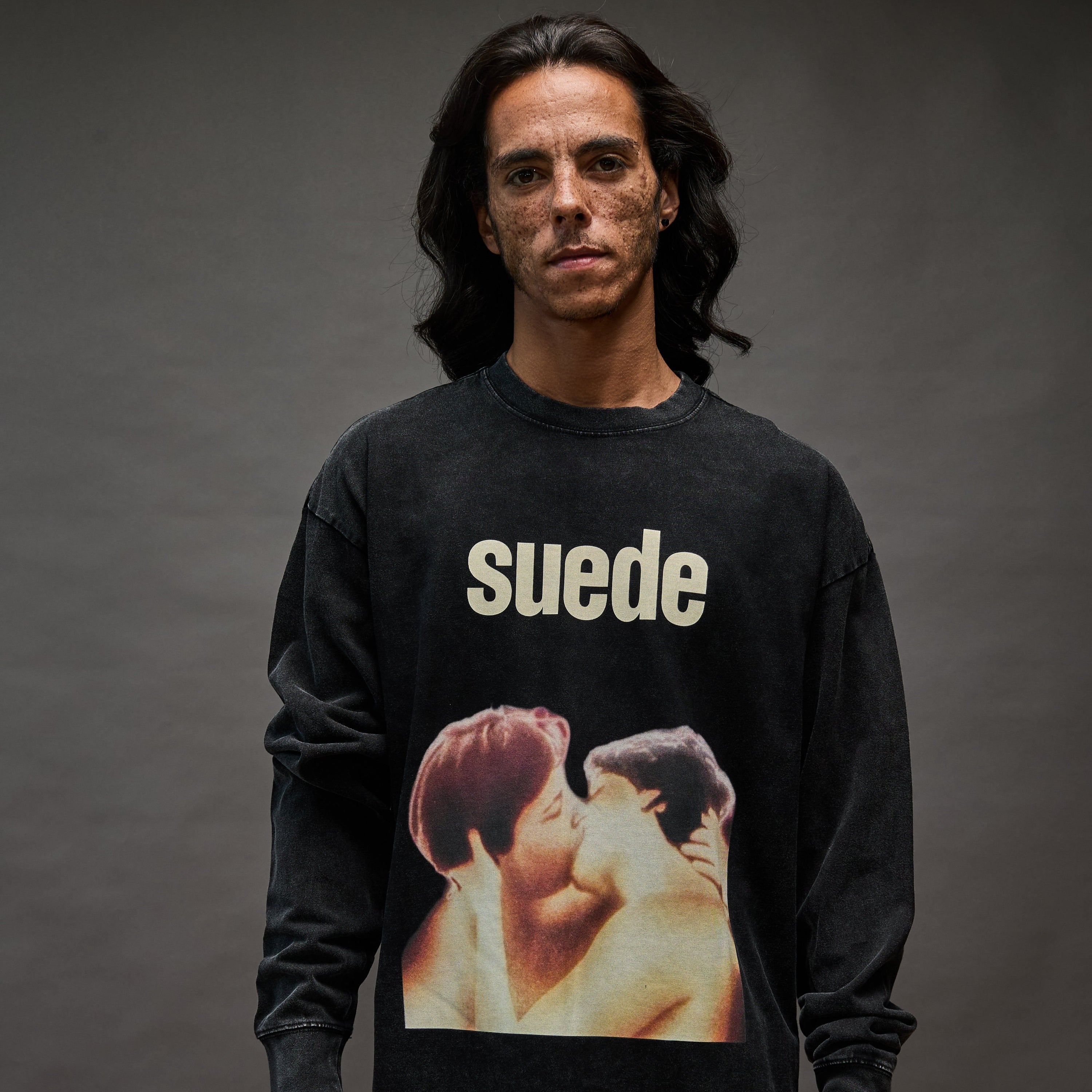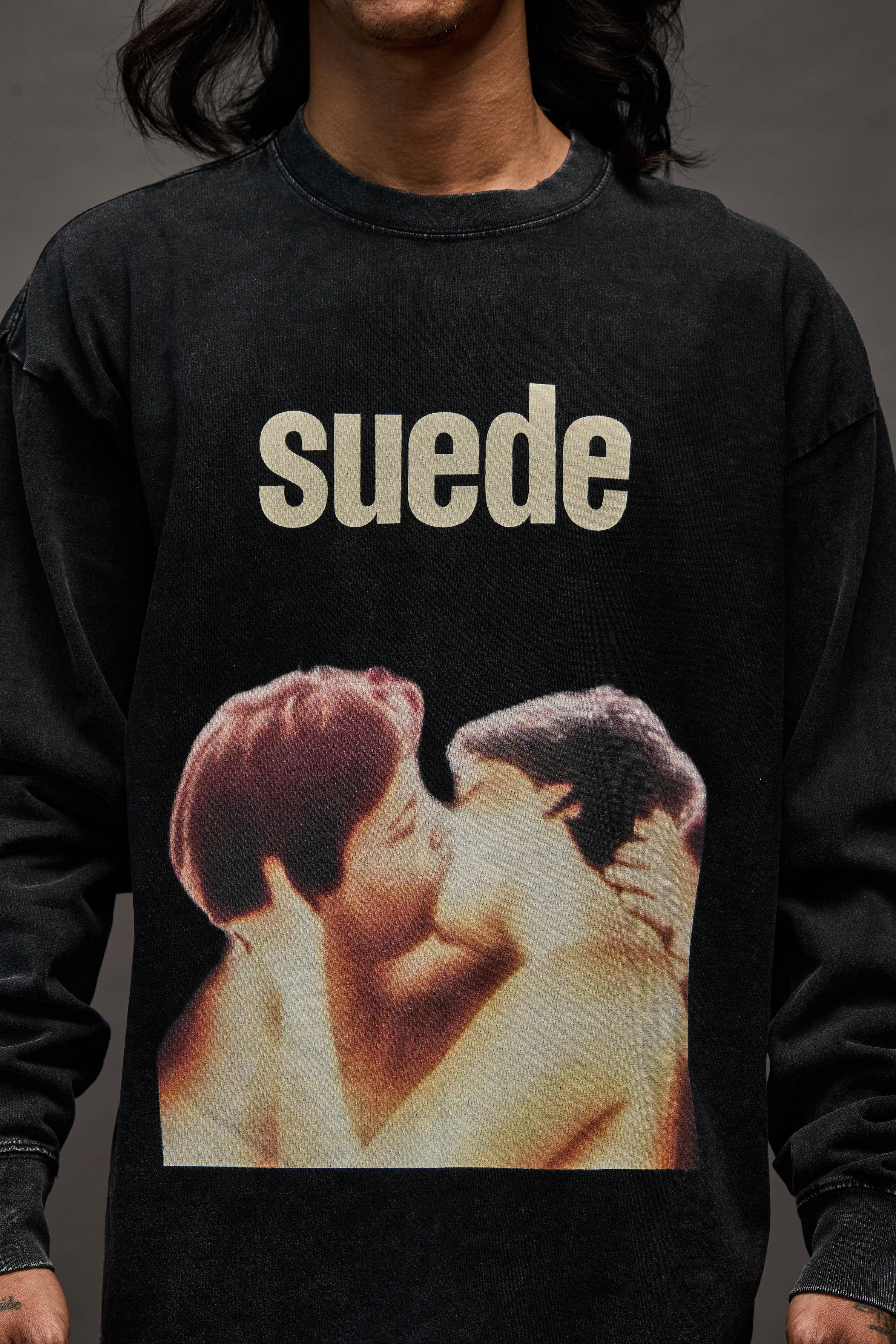SUEDE ACID WASH
SPECS
- 100% cotton
- Middleweight 7 oz / yd² fabric
- Unisex
- Oversized fit
- Wash cold, inside out, on gentle / Hang dry
- Made in the People's Republic of China at a factory certified by OKEO-TEX (product and environmental safety), GRS (recycling), BSCI and SLCP (workplace conditions), and the China Forest Certification Council (environmental standards).

PRODUCT DESCRIPTION
I didn't get bullied until I went to college, where I encountered frat boys. About once a week, the mediocre scions of upper-middle class Midwestern families would yell homophobic slurs at me on the streets around campus.
At the time, the artwork for Suede's eponymous 1993 debut album hung on the wall of my dorm room. The androgynous pair captured mid-kiss corresponded to Suede's sexual ambiguity—specifically that of the singer. On the track "Animal Nitrate," Brett Anderson sang, "Pierce your right ear / Pierce your heart here / The skinny boy's one of the girls." On "The Drowners," Anderson sang, "We kiss in his room to a popular tune." Earlier on the same track, he teased, "He writes the line / Wrote right down my spine / It says, 'Oh, do you believe in love there?'"
This vibe extended to Anderson’s dress. He grew his bangs long and swept to the side, which I mimicked. He hung large silver hoops worthy of the high seas from his ears, which I mimicked. His outfits often involved slinky leather jackets worn without a shirt underneath. I skipped that part. (Instead I went with cuffed jeans, Doc Martens, and thrift-shop blouses.)
Anderson ’s overall presentation fit within a tradition of sexual ambiguity in English music that extended back at least to the New Romantics. However, by the mid-1990s, a noxious lad culture was ascendant. Damon Albarn’s working-class pretensions defined the scope of his band Blur. In 1994, Albarn gave a sneering interview to preeminent lad mag Loaded, in which he sarcastically joked, “I’m more homosexual than Brett Anderson.” Before the interview concluded, Albarn reassured the magazine’s yobbo audience that “When you get down to it, you can’t beat a great pair of tits.”
The “more homosexual” jibe referenced an unfortunate comment that Anderson had previously made the same year. Speaking to ID magazine, Anderson said, “I am a bisexual man who has never had a homosexual experience.” Many LGBTQ+ people felt that the comment trivialized their experiences. In October 1994, Anderson and his bandmate Simon Gilbert appeared on the cover of the LGBTQ+ magazine Attitude, alongside the headline, “Suede: Too fey or two-faced?”
In the related feature story, the musicians discussed accusations that they “played at being gay” for attention. Anderson clarified his controversial statement, saying, “I don’t feel 100 percent akin to the male world or 100 percent akin to the female world.” Gilbert, who had come out as gay in 1993, said: “I have to say that I really sympathise with Brett’s position. I’ve called myself a bisexual person who’s never had a heterosexual experience. I never wanted to fit into the stereotypical image of what a gay person is.”
One night while at Ohio University, I walked back towards my apartment with a woman. She and I had met at a venerable drinking establishment called Tony’s. Making our way down Union Street, we encountered a pack of frat boys. One of them wondered aloud, “What is she doing with that rainbow fucking f*****?” This man was genuinely enraged. I still remember his contorted face. He could not comprehend why a woman would be attracted to me, resplendent though I was with the swept bangs, pirate hoops, and the rest. How could she not recognize him—dressed very much like his peers in boat shoes, cargo shorts, polo shirt, backwards baseball cap, and swaths of entitlement—as the apotheosis of real masculinity?
These brushes with homophobia had become commonplace. They stung, insofar as they made me fearful for my safety. In this instance, the fear subsided some time later on a cheap mattress, under a poster that depicted a kiss between models whose gender and sexuality were uncertain, but whose passion was very much real.





